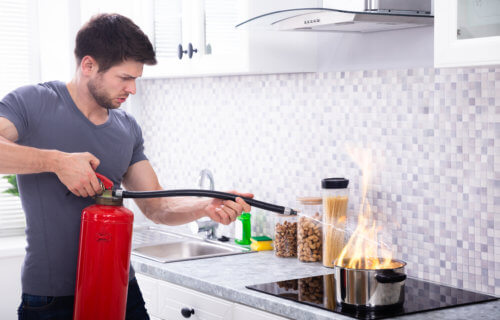BOCA RATON, Fla. — Millennials may have a flare for the dramatic when it comes to making dinner, but it turns out few actually know what they’re doing in the kitchen. A new survey finds young adults consider themselves to be the most “adventurous” cooks. Unfortunately, millennials also cook the fewest number of meals at home and overwhelmingly failed when researchers tested their knowledge about cooking and kitchen safety.
In a poll of over 1,000 people, conducted by Cinch Home Services, researchers looked at how the coronavirus pandemic changed the cooking habits of adults of all ages over the last year. As dining in becomes “a thing” again, the poll finds over half of respondents (52.6%) are indeed cooking meals at home often. Another 28 percent claim they “always” cook at home now.
However, when you break that down further, researchers find millennials are the least likely to say they often or always cook. This matches up with the survey finding young adults are also the most likely to order take out.
Despite their pots and pans collecting dust for most of the week, younger respondents describe themselves as being more “adventurous” home chefs. On a scale from one to 10, millennials rate themselves as a 6.4 for their out-of-the-box cooking ideas. For comparison, members of Generation X rate themselves as a 6.0 and baby boomers consider themselves a 5.9 on the adventurous scale.
Yuck! Shut that kitchen down!
Whether Americans are cooking boring meals or flashy meals, most are not up to speed on their overall cooking knowledge. The survey finds over 60 percent of all respondents failed a quiz testing their knowledge about all sorts of kitchen dos and don’ts.
This quiz included asking adults about the correct temperature for cooking meat, the proper way to handle meat, basic cleaning rules, and general safety knowledge. Of the 62 percent who failed this quiz, the results were the worst among (you guessed it) millennials. In fact, kitchen knowledge got worse as respondents got younger.
Two in three millennials failed the kitchen knowledge quiz. That number was 58 percent among Gen X and less than 48 percent among baby boomers — meaning the majority of older adults correctly knew the proper way to safely cook in their own home.
Regardless of age, 70 percent of the poll did not know what temperature they should cook fresh beef to. Over half of Americans admit they’ve thawed frozen meat in an unsafe way.
As for germs elsewhere in the kitchen, 36 percent say they don’t throw out their cleaning sponges as often as they should. Speaking of those germs, one in three people believe in the “five-second rule,” with millennials being the most likely to say food falling on the floor is still good.
Perhaps most concerning, the poll finds more people have a meat thermometer in their kitchen than a fire extinguisher.
Put down the salt and step away from the counter
When people are cooking their own meals, the poll also finds they’re not always the best tasting creations one could hope for. Among the most common cooking mistakes, nearly six in 10 (56.8%) say they’ve put too much salt or seasoning in a dish.
Other cooking faux pas include forgetting an ingredient (51%), not adding enough salt (51%), forgetting to turn the oven off (50%), and finding hair in your own cooking (46%).
It turns out men are more likely to cook a meal that gives someone food poisoning. Meanwhile, members of Gen X are the most likely group to drop a non-food item into their cooking.
While the Cinch team notes every kitchen needs a fire extinguisher in it, some cooks appear to need them more than others. The survey finds women and baby boomer respondents were the most likely to say they’ve started a kitchen fire.
